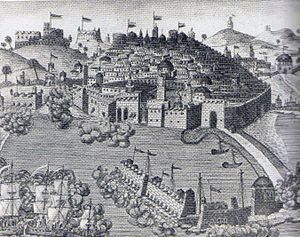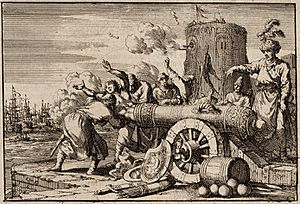Franco-Algerian war (1681–1688) facts for kids
Quick facts for kids Franco-Algerian War 1681–1688 |
|||||||||
|---|---|---|---|---|---|---|---|---|---|
 Bombardment of Algiers by the fleet of Admiral Duquesne in 1682 |
|||||||||
|
|||||||||
| Belligerents | |||||||||
| Commanders and leaders | |||||||||
The French-Algerian War of 1681–1688 was a series of conflicts between France and the Regency of Algiers. This war was part of a larger effort by France to stop the actions of the Barbary Pirates in the 1680s. These pirates often captured ships and took their crews as prisoners.
Contents
Why the War Started
In October 1680, Barbary pirates captured several French ships. They did this without declaring war. The captains and crews were taken to Algiers and held as prisoners.
On October 18, the leader of Algiers, known as the Dey, Baba Hassan, officially declared war on Louis XIV, the King of France. A few days later, he told the French consul, Jean Le Vacher, that fighting would begin. He also sent twelve warships to sea. When King Louis XIV heard this, he ordered his officials to prepare a strong response.
First Attack on Algiers (1682)
In 1682, the French fleet, led by Admiral Abraham Duquesne, attacked Algiers. They used bombs to damage the city and its port. About 500 Algerians were killed, and many buildings were destroyed. The French fleet did not suffer many losses.
This attack forced the Dey of Algiers to ask for peace. However, Admiral Duquesne's main goal was to make Algiers completely surrender. He could not achieve this due to time and bad weather. King Louis XIV was not happy that the mission did not fully succeed. Still, he saw how much damage a small number of bombs (about 280) had caused.
Even though the French forced Algiers to free some Christian prisoners in later attacks, they could not completely stop the pirate attacks by the Regency of Algiers on European merchant ships in the Mediterranean Sea.
Second Attack on Algiers (1683)
The next year, Admiral Duquesne sailed to Algiers again for a second attack. The bombing started on the night of June 26–27. Over 200 bombs were launched in less than 24 hours. These bombs caused fires and chaos in Algiers. Around 300 Algerians were killed.
The Dey, Hassan Dey, wanted to keep fighting. But the people of Algiers urged him to seek peace. Duquesne agreed to a temporary stop in fighting, called a truce. His condition was that all Christian prisoners must be released.
Peace Talks and Renewed Fighting
When the truce ended, Hassan Dey asked for more time, which he received. Duquesne then listed his terms for a peace agreement:
- All Christian prisoners must be set free.
- Algiers must pay France for all goods taken by pirates.
- Algiers must send a special group to King Louis XIV to apologize for their actions.
These terms made the Dey decide to continue fighting instead of agreeing to peace.
One of the Algerian commanders, Mezzo Morto Hüseyin Pasha, took control. He said the Dey was a coward for trying to make peace with the French. He had the Dey killed and was chosen as the new leader by the janissaries (soldiers). Soon, a red flag was raised, telling Duquesne that the fighting had started again.
The Algerians responded to the French bombs in a very cruel way. They harmed the French consul, Jean Le Vacher, and other French prisoners. Despite this fierce resistance, a huge fire spread through Algiers. It destroyed palaces, mosques, and many other buildings. The city was in ruins, but Duquesne ran out of bombs. The attack ended on July 29.
After the 1683 Bombardment
The Algerian pirates were greatly weakened. As the French fleet returned to France, Algiers sent a special group to King Louis XIV. They asked for his forgiveness for the harm and cruelty the pirates had caused France.
The new Dey, Mezzo Morto Hüseyin Pasha, agreed to free 546 more prisoners. However, he refused to sign a peace agreement with Duquesne, who was 79 years old. So, King Louis XIV sent another envoy, Anne Hilarion de Tourville, to negotiate. They agreed to a hundred-year peace treaty. This treaty included a promise that Algiers would not bother the coasts of France.
Five years later, Algiers broke the treaty. So, the French attacked the city again. Admiral d'Estrées forced the Dey to agree to a new peace treaty. This treaty was signed on September 27, 1688, and the Algerians respected it. After this, the pirate captains avoided the French coasts. However, they continued their raids elsewhere, causing much damage to the coastal areas of Spain.
Third Attack on Algiers (1688)
In 1688, King Louis XIV ordered another military mission against the Regency of Algiers. This was to make sure Algiers followed the peace treaty of 1683, which Algerian pirates had broken. The French fleet had 31 ships and 10 bomb ships. It was led by Jean II d'Estrées.
Admiral d'Estrées' fleet arrived at Algiers on June 26. They caused serious damage to the city. However, Algiers had made its defenses stronger since the French attacks in 1682 and 1683. Because of this, the French fleet lost several ships and had to leave after 16 days. Mezzo Morto responded by attacking the French coast and French ships.
What Happened Next
By the end of 1688, the Dey felt very powerful. He even refused to let a representative from Istanbul land in Algiers. This show of strength worried the janissaries, who feared losing their influence. They removed him from power and chose Hadj-Chabane as the new Dey.
Relations with France, which had been difficult, improved after 1688. This was especially true after Dey Mohammed-el-Amine sent an ambassador to France. On September 24, 1689, a new treaty was signed in Algiers.
 | Percy Lavon Julian |
 | Katherine Johnson |
 | George Washington Carver |
 | Annie Easley |


